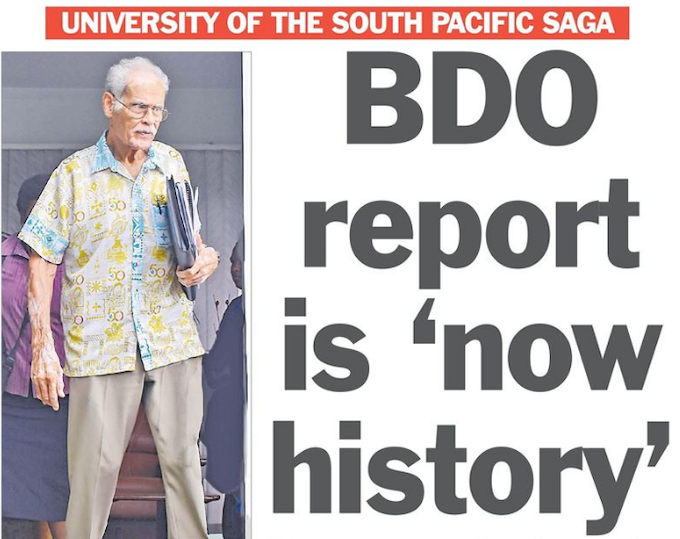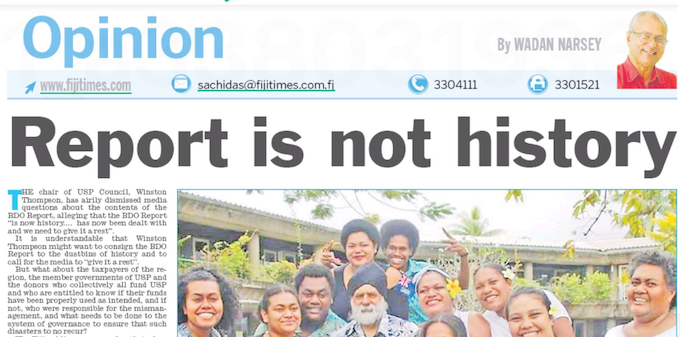
COMMENT: By Wadan Narsey
The current chair of USP Council, Winston Thompson, has airily dismissed media questions about the contents of the BDO Report, alleging that the report “is now history…. has now been dealt with and we need to give it a rest”.
It is understandable that Winston Thompson might want to consign the BDO Report to the dustbins of history and to call for the media to “give it a rest”.
But what about the taxpayers of the region, the member governments of USP and the donors who collectively all fund USP and who are entitled to know if their funds have been properly used as intended, and if not, who were responsible for the mismanagement, and what needs to be done to the system of governance to ensure that such disasters to no recur?
READ MORE: Special reports on the USP leadership crisis
The Fiji public may remember that when the public called for a public inquiry into the National Bank of Fiji (NBF) disaster the then Minister of Finance (the late Bernard Vunibobo) said famously “it is water under the bridge”. No public inquiry was ever held, no lessons were learnt, and government financial scams continued year after year as miscreants were not held to account.
That NBF crisis and now the USP crisis all lend substance to the oft quoted truism “those that do not learn from the mistakes of history are destined to repeat them”.
Or as Labasa wit Sukha Singh pointed out to Winston Thompson, “can we now expect this USP disaster is to be taught in history classes in schools?”. Probably not.
While the public are calling for the BDO Report to be made public, two blogsites (FijiLeaks and Coup 4.5) have had the BDO Report freely available to the public.
While the BDO Report does reveal much evidence of many of the USP shenanigans, it is strangely reluctant to draw the correct conclusions from the evidence that themselves have uncovered.
Note that the BDO Report admitted that they could not read all the documents made avaialble to them or do a full investigation.
We can also ask why USP Council did not call for a full investigation of the allegations (and constructive recommendations) made by a former senior manager at USP (Dr Dilawar Grewal) who was also terminated by the former VC Chandra.
Grewal’s fascinating and perceptive Report on the weaknesses at USP’s senior management level is also freely available on the blogsite Fijileaks.
Why was BDO hired?
BDO New Zealand was hired by the audit and risk committee of USP (chair Mahmood Khan) to undertake an investigation into the allegations raised by a paper tabled by USP VC Pal Ahluwalia at a USP Council meeting of 15-16 May 2019 in Vanuatu: “Issues, Concerns, and Breaches of Past Management and Financial Decisions” (“Paper”).
BDO presented their report dated 21 August 2019, noting that they had not been able to peruse all the documents that had been made available to them.
But BDO strangely managed through the assistance of USP’s IT section, to access the emails (and breach the privacy) of all the persons who may have had any role in the allegations that had been raised by the VC Ahluwalia, including the VC himself.
The BDO Report grouped the allegations under five headings under which all the allegations were examined:
- Transition issues during the period when VC designate Ahluwalia came to USP
- Professional leave and deferment of the former VC’s backpay
- Recruitment, appointments, promotions and staff reviews
- Responsibility allowances
- Financial delegation breach and attempted use of VCP Contingency Fund.
This article DOES NOT address the persons and issues under the headings 2, 3, 4 and 5, juicy as they are.
This article only discusses the 15 allegations (14 made by Ahluwalia with one more wisely added by the BDO Team because of the evidence they uncovered concerning another head of department and professor who (interestingly) had not been not named in the Ahluwalia Paper.
The transition period
It is a pity that the BDO Report does not clearly set out the timeline of complaints by Ahluwalia in this transition period, because Ahluwalia had complained quite early on to chair of USP Council Winston Thompson.
Although the last contract of vice-chancellor Rajesh Chandra was to finish mid-2018, he prevailed upon USP Council to extend it to the end of 2018 to enable him to take part in the USP@50 celebrations.
USP Council approved the appointment of vice-chancellor Ahluwalia on 23 May 2018, to officially commence on 1 November 2018 as VC Designate, and then fully take over as VC from 1 January 2019.
The chairman of USP Council (Winston Thompson) noted that he had met with vice-chancellor Rajesh Chandra and cice-chancellor designate Ahluwalia on 23 July 2018 and called on vice-chancellor Chandra to fully consult with the vice-chancellor designate Ahluwalia on all important HR decisions from then on.
Vice-chancellor designate Ahluwalia had the understanding, completely sensible, that the retiring vice-chancellor would consult with the incoming vice-chancellor on substantive appointments, contract renewals and promotions from then onwards, as Ahluwalia would have to work with them.
Indeed, chair Thompson had called on vice-chancellor Chandra to fully consult Ahluwalia but clearly, that did not occur.
It is strange that Thompson, Chandra and Ahluwalia have different recollections of what was agreed upon at that meeting and amazingly, there were no minutes of this meeting, responsibility for which failure must be on the USP managers (vice-chancellor Chandra and Chair Thompson).
But there is an email on 27 August 2018 in which Professor Ahluwalia complained to Thompson “that it had become clear that the VCP had no intention of consulting Professor Ahluwalia as they had agreed [and that] he would like to be consulted prior to any further appointments”.
The BDO Report concluded obtusely in the double negative “the comments in this email do not refute that Professor Ahluwalia was not consulted”. i.e. read: Ahluwalia was not consulted.
Then the BDO Report noted that Professor Ahluwalia again complained (email 4 November 2018) after he had commenced his role as VCD, “decisions must be made collaboratively between the VCP and VCD…. that many senior positions that should have been advertised had been extended or were being considered for extension and that these positions will have an impact on his ability to shape the senior management team.”
Ahluwalia repeated that he was available and ready to cooperate and he requested chairman Thompson to make “make it clear that these decisions must have his input”.
Pro chair Thompson’s verified (email 5 November 2018) that “no decision on staffing will be taken without the VCD’s input now that he has arrived in Fiji” except for some temporary appointments or extensions to maintain continuity in critical areas.
But in his paper to USP Council, VC Ahluwalia stated that except for a minor two cases, the required consultation did not occur in some 14 major decisions some of which were irregular and serious enough for him to send his paper to USP Council.
Were Ahuwalia’s allegations correct?

Executive Summary of BDO Report
The BDO Executive Summary noted that their investigation had substantiated a number of allegations.
Only on 2 of the allegations in the transition period (Jai Karan and Hasmukh Lal), the BDO Report concluded that the allegations were “partially substantiated”.
On 11 other allegations the BDO Report agreed that they “saw no evidence” of consultation with Ahluwalia, but they still strangely concluded “Allegation not substantiated”.
Jokhan
Bibya Sharma
Utkal Mehtha
Prem Misir
David Peeks
Thomas Lange
Akanisi Kedrayate
Eric Colvin
Mohammed Umar
Kolinio Boila
Arvind Patel
Anyone with common sense would say, surely if VC Ahluwalia said he was not consulted on these major HR decisions (and I make no comment on their financial implicaitons), and if the BDO Report explicitly stated that “it could find no evidence” of any consultation by the former VC, then VC Ahluwalia’s allegations were substantiated. How could the BDO Report allege otherwise that they “were not substantiated”?
All that the BDO Report conceded was that that a number of decisions by the former VC “did not make commercial sense”.
The public can themselves read the BDO Report on the juicy details to understand how even this observation on major financial shenanigans has to be called the “understatement of the year”.
Conclusion
Any reasonable person concerned about the proper use of taxpayers funds and reading the few details in the BDO Report must conclude that a fuller and independent inquiry must be done which examines the responsibilities of ALL the stakeholders in USP, including USP Council itself.
For instance, the BDO Report itself noted in the Executive Summary that similar themes and weaknesses that they were outlining, had been previously identified by KPMG in their role as internal audit service provider, with many discrepancies in Payroll (2 “high” and 6 “moderate), HR Recruitment and contract management (7 “high” and 3 “moderate”) and HR development (6 “high” and 3 “moderate”).
The BDO Report noted that these KPMG Reports pointed to a need for greater control and oversight, they were only partially implemented, or in some cases, not at all. Why not?
Why did the BDO Team not consult Ikbal Janif or Dame Fiame Mataafa, both of whom had been deputy chair and chair of USP Council during the tenure of the former VC?
Why did the BDO Team not consult Dr Dilawar Grewal who had been terminated by the former VC, and who had sent a full report of complaints to the chairman of USP Council (Winston Thompson)?
Was USP Council even given Grewal’s comprehensive report and litany of complaints?
Lastly, even if the current chair airily declares that the allegations against him were “minor” and he was ready to work with the reinstated VC Ahluwalia, surely USP Council must ask whether it is fair to VC Ahluwalia to ask him to continue to work under a chair who so readily suspended him instead of praising him for being a brave whistleblower.
Dr Wadan Narsey is a an independent economist and writer and also a former professor of economics at the University of the South Pacific. He has also been a regular columnist for the Fiji Times, Pacific Scoop and the Pacific Media Centre, a former Fiji parliamentarian, and a prolific commentator on the key economic, social and political issues facing Fiji and the Pacific. This article was first published in The Fiji Times today and has been republished with permission. The full article is on Dr Narsey’s website.













































